This post is also available in: Spanish
Photos from BIC training with Society and Disability and the Peruvian Down Syndrome Society, Access Bangladesh Foundation, and National Union of Disabled Persons of Uganda.
Disability and poverty are inextricably linked. Poor infrastructure creates barriers to inclusion in mainstream society; malnutrition and lack of adequate healthcare leads to disabling conditions; and war and conflict in many developing and transition countries results in a higher number of people with disabilities due to violence and trauma. Disability affects approximately one billion people around the world, a large majority of whom live in developing countries but have been systematically left out of development programs and policies. This exclusion hinders their right and subsequent opportunities to benefit from national programs, including poverty reduction projects.
Persons with disabilities must be included in development programs, and the World Bank plays a pivotal role in ensuring inclusive development around the world. The World Bank must take the lead in inclusive international development by mandating systematic inclusion of disability into World Bank operations, ensuring that all relevant Bank-funded projects are inclusive in design and implementation.
The World Bank’s Environmental and Social Safeguard Policies are designed to mitigate social and environmental risks associated with World Bank investments. But, as the safeguards currently being implemented stand, the rights of persons with disabilities, mainstreaming, and inclusive development have not been addressed. As a result persons with disabilities, often some of the poorest and most vulnerable people in countries where the World Bank has its projects, are not systematically consulted or considered in the planning and design of projects.
The Bank Information Center (BIC) Disability and World Bank Safeguards Campaign aim to ensure that the World Bank adopts a systematically inclusive approach to its engagement in developing countries. As the World Bank reviewed its safeguard policies, the Campaign worked to ensure that disability would be adequately addressed in the new safeguards.
On August 4, 2016, the World Bank Board of Executive Directors approved a new Environmental and Social Framework (ESF) that will soon replace the World Bank safeguards currently being implemented in 2018. This new ESF will specifically look at how projects are impacting persons with disabilities to ensure that no harm is being done, and that persons with disabilities can share in project benefits. Sharing in project benefits is critical in light of the fact that many of the projects the Campaign and its partners have investigated furthered existing harms of leaving children and persons with disabilities out of education, mass transport, agriculture, or vocational training. Now, with the new ESF, there can be recourse when persons with disabilities do not share in project benefits.
More specifically, persons with disabilities are explicitly referenced in the Bank Directive Addressing Risks and Impacts on Disadvantaged or Vulnerable Individuals or Groups as one of the disadvantaged or vulnerable groups. Additionally, disability is referenced in the ESF in:
- the vision statement
- the Labor Standard (ESS 2) among vulnerable workers and in the section on non-discrimination and equal opportunity
- the Information Disclosure and Stakeholder Engagement Standard (ESS 10) regarding accessible information. “Accessibility” is defined to ensure participation of persons with disabilities in consultation and so that information is disclosed appropriately
- The Community Health and Safety Standard (ESS 4) also references “universal access” regarding construction.
These references to persons with disabilities specifically, and to concepts that are essential for the inclusion of persons with disabilities, provide many hooks to ensure that projects address the needs of persons with disabilities. Given that the language is now in the policy, disability must be looked at systematically rather than in an ad hoc manner as before.
The Campaign will continue to work to ensure that the ESF and supporting documents address the needs of persons with disabilities, and to provide information for implementers on how to include persons with disabilities in all phases of the project lifecycle. The Campaign will also monitor projects in Peru and Uganda to identify implementation challenges and the impact of projects on persons with disabilities.
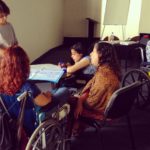 World Bank Cannot Consult Us and Forget Us: Disability Must be Explicitly Addressed in New World Bank Safeguards
World Bank Cannot Consult Us and Forget Us: Disability Must be Explicitly Addressed in New World Bank SafeguardsThis post is also available in: SpanishTraining with the disability community to prepare for the safeguard consultation in Lima, Peru February 2015 We have been advocating to ensure that persons with...
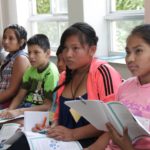 World Bank forgoes transparency, participation in addressing vulnerable groups
World Bank forgoes transparency, participation in addressing vulnerable groupsThis post is also available in: SpanishChildren in Peru attend BIC workshop on World Bank safeguards / BIC 2015 In August 2015 the World Bank flagged as one of the four goals of the safeguards review...
 The impact of the World Bank funded Uganda Health systems strengthening project on persons with disabilities: A case study of Itojo and Kiryadongo Hospitals
The impact of the World Bank funded Uganda Health systems strengthening project on persons with disabilities: A case study of Itojo and Kiryadongo HospitalsThis post is also available in: SpanishThe National Union of Disabled Persons of Uganda (NUDIPU) assessed the impact of the World Bank funded Uganda Health systems strengthening project on persons wit...
 Is the World Bank Reaching out to School Children with Disabilities under the Bangladesh ROSC II Project?
Is the World Bank Reaching out to School Children with Disabilities under the Bangladesh ROSC II Project?This post is also available in: SpanishBangladesh has made significant progress in education over the past two decades. With nearly 18 million children enrolled in about 80,000 primary schools in the...
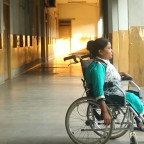 Video: Access Bangladesh Foundation on World Bank Project and Disability
Video: Access Bangladesh Foundation on World Bank Project and DisabilityThis post is also available in: Spanish Access Bangladesh Foundation which advocates and promotes equality for disabled, underprivileged and extremely poor people in all spheres of life, through educa...
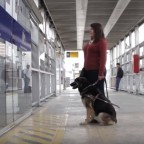 Video: Persons with Disabilities and Lima’s Metropolitano
Video: Persons with Disabilities and Lima’s MetropolitanoThis post is also available in: Spanish Society and Disability and the Peruvian Down Syndrome Society, civil society organizations in Peru advocating for the rights of persons with disabilities, have...
 Video: Disabilities and the National Agriculture Advisory Services in Uganda
Video: Disabilities and the National Agriculture Advisory Services in UgandaThis post is also available in: Spanish The National Union of Disabled Persons of Uganda (NUDIPU), an indigenous umbrella organization of persons with disabilities (PWDs) in Uganda working to promote...
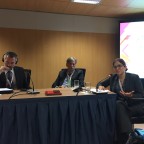 Disability and Safeguards at the 2015 World Bank Meetings
Disability and Safeguards at the 2015 World Bank MeetingsThis post is also available in: SpanishThe Disability and World Bank Safeguards Campaign, together with its Peruvian focal point organizations Society and Disability and the Peruvian Down Syndrome Soc...
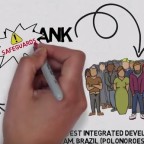 BIC video: the World Bank safeguards explained
BIC video: the World Bank safeguards explainedThis post is also available in: Spanish The World Bank has a complex track record with human rights and the environment. On one hand, they are one of the world’s most important development insti...
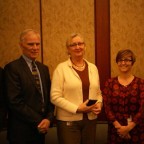 U.S. Congressional Hearing Highlights World Bank Aversion to Human Rights Commitments
U.S. Congressional Hearing Highlights World Bank Aversion to Human Rights CommitmentsThis post is also available in: SpanishOn September 30th, the Tom Lantos Human Rights Commission held a hearing at the United States Congress on international financial institutions (IFIs) and human r...
Peru: Basic Education Project
BIC partners from Society and Disability held a discussion on their case study on the Basic Education Project for Peru, highlighting the impacts of the project on children and youth with disabilities. The case study is helpful in thinking through how the Bank should address barriers for all children and youth, including those with disabilities, when designing Bank projects. They discuss some concrete recommendations as to how these barriers can be assessed and overcome.
Uganda: National Agriculture Advisory Services
The National Union of Disabled Persons of Uganda (NUDIPU) has produced a video on the impact of the World Bank funded National Agriculture Advisory Services (NAADS) in Uganda on persons with disabilities. Samuel Owere’s experience is not indicative of the experience of the majority of farmers in Uganda with disabilities but exemplifies how very small changes in project design can have great impact on beneficiaries.
Read the full case study on the National Agricultural Advisory Services here.
Peru: The Metropolitano
The Metropolitano represented a unique opportunity for persons with disabilities in Lima to gain access to a public transportation system for the first time as no other mass transit system in the city had been even remotely accessible. However, given the lack of policies at the World Bank that address the specific needs of persons with disabilities, the Metropolitano was not built to be fully accessible which then caused the Bank to reinvest to improve accessibility features of the project.
Read the full case study on the Metropolitano here.
Bangladesh: Skills and Training Enhancement Program
Access Bangladesh Foundation researched the World Bank funded Skills and Training Enhancement Project (STEP) in Bangladesh. Despite there being a high demand but short supply of skilled workers in Bangladesh, persons with disabilities are often excluded from this training project that would allow them to enter into the workforce. In the majority of training centers throughout the country, there are no persons with disabilities. This is often the result of inaccessible facilities or lack of staff training to be able to support persons with disabilities.
Campaign Documents
Campaign StatementCampaign Overview One Pager
Key Asks
Disability and Safeguards Overview in Arabic (الحملة حول تضمين معايير اإلعاقة في سياسات البنك الدولي الوقائية)
Integrating Disability into the Safeguards
Universal Access and Inclusion Plan Bank Submission ESS1, 10 Annex 2Bank Submission ESS1 Annex 1
How and Why Disability Should be Integrated into the Safeguards
Environmental Assessment with Disability
Indigenous Peoples with Disability
Involuntary Resettlement with Disability
CSO Letters
Civil society letter on disability and Safeguards (2012)International Day of Persons with Disabilities Civil Society Letter to President Kim (2012)
FINAL World Bank Disability and Development Unit Letter (2013)
World Bank Responses
World Bank Response to Civil Society Letter on Disability and Safeguards (2012)World Bank Response to Civil Society Letter on the International Day of Persons with Disabilities (2013)
Bank Response Disability Unit Letter (2013)
World Bank Safeguards
Civil Society Fact Sheet on World Bank Safeguards
Case Studies on the Impact of World Bank Projects on Persons with Disabilities
Bangladesh ROSC II Case Study (2015)Uganda Health Systems Strengthening Project Case Study (2015)
Bangladesh STEP Case Study (2015)
Peru Metropolitano Case Study (2015)
Uganda NAADS Case Study (2015)
Philippines CCD Case Study (2014)
Nupidu Kasese Case Study (2014)
Philippines CCT Study (2012)
Nusafii Report (2012)
Lebanon LPHU Case Study (2012)
Audio
Disability and Safeguards Campaign Contact:
Rachel BurtonDisability & Safeguard Campaign Manager
+1 202 624-0637
rburton@bicusa.org
World Bank Contacts
Charlotte McClain-NhlapoDisability Advisor
cmcclainnhlapo@worldbank.org






